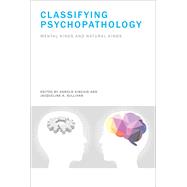In this volume, leading philosophers of psychiatry examine psychiatric classification systems, including the Diagnostic and Statistical Manual of Mental Disorders (DSM), asking whether current systems are sufficient for effective diagnosis, treatment, and research. Doing so, they take up the question of whether mental disorders are natural kinds, grounded in something in the outside world. Psychiatric categories based on natural kinds should group phenomena in such a way that they are subject to the same type of causal explanations and respond similarly to the same type of causal interventions. When these categories do not evince such groupings, there is reason to revise existing classifications.
The contributors all question current psychiatric classifications systems and the assumptions on which they are based. They differ, however, as to why and to what extent the categories are inadequate and how to address the problem. Topics discussed include taxometric methods for identifying natural kinds, the error and bias inherent in DSM categories, and the complexities involved in classifying such specific mental disorders as “oppositional defiance disorder” and pathological gambling.
Contributors
George Graham, Nick Haslam, Allan Horwitz, Harold Kincaid, Dominic Murphy, Jeffrey Poland, Nancy Nyquist Potter, Don Ross, Dan Stein, Jacqueline Sullivan, Serife Tekin, Peter Zachar






